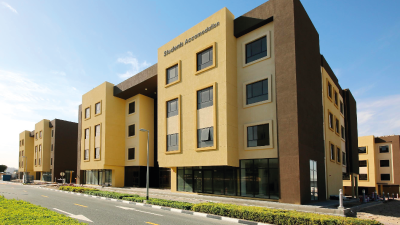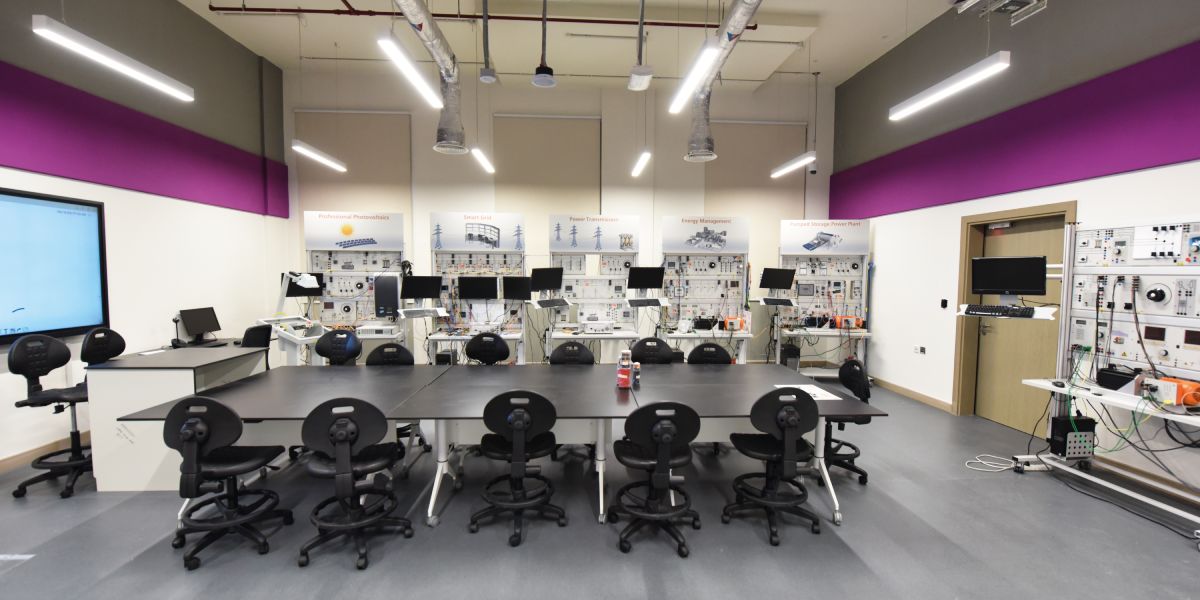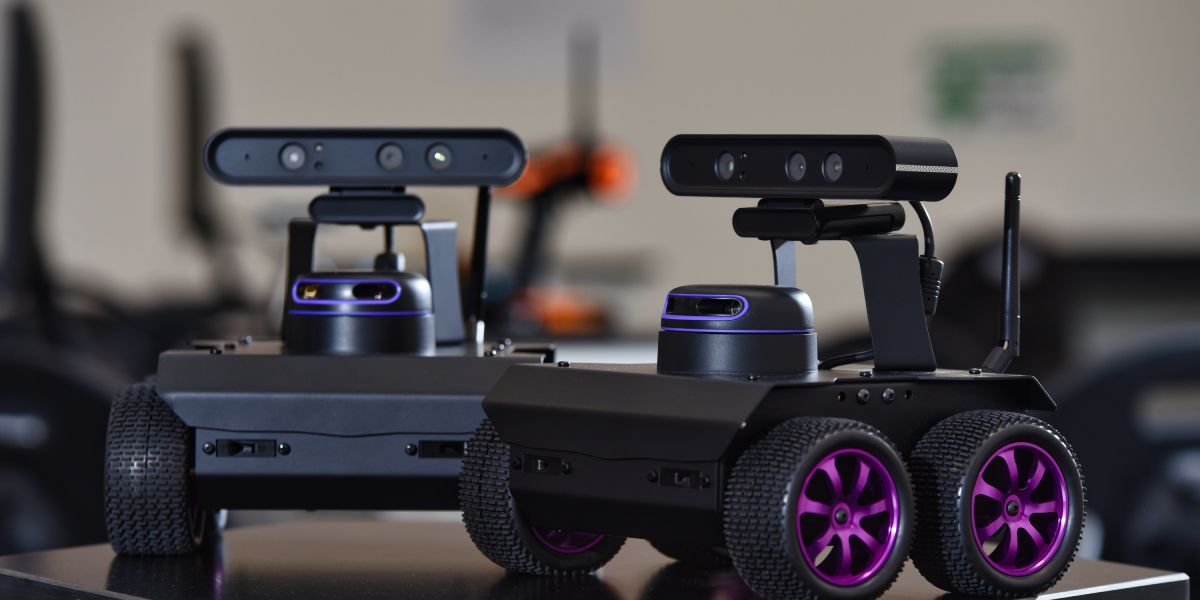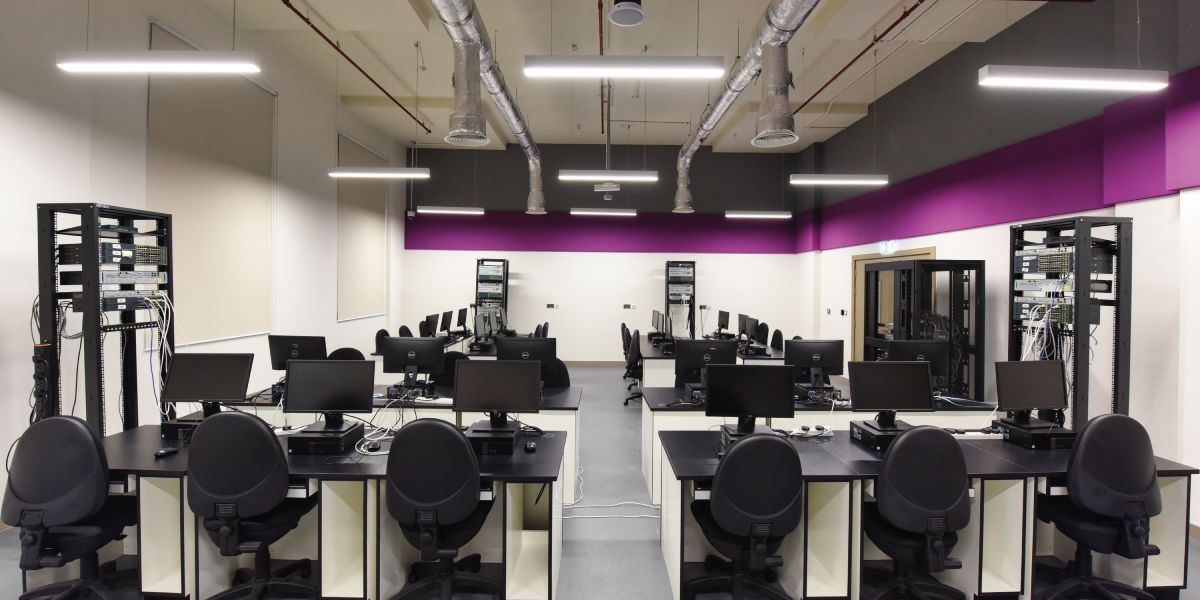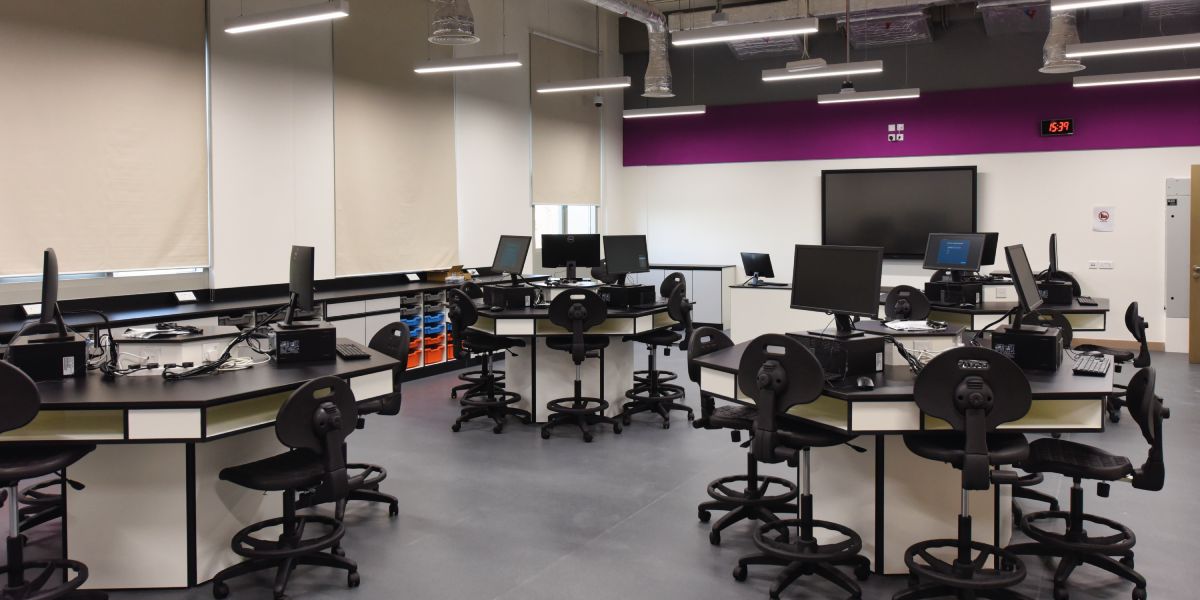Master of Science in Electrical Engineering

Electrical Engineering
Master of Science Degree
- RIT/
- RIT Dubai/
- Academics and Learning/
- Graduate Degrees/
- Masters of Science in Electrical Engineering
Accredited by the UAE Ministry of Education
An electrical engineering master's degree that merges technology, engineering, and science and applies them to practical, industrial, and business applications.
Overview
Rapidly developing global technologies are changing the way we live. The Master of Science (MS) in Electrical Engineering at RIT Dubai combines theoretical fundamentals and practical applications in this dynamic field and educates students in the practices, methodologies, and cutting-edge techniques used in electrical engineering including Artificial Intelligence. Students will build on experience of engineering and focus their studies in AI/Robotics, Communications, or Smart Energy while working closely with electrical engineering faculty in a contemporary and applied research area. The MSEE degree requires the completion of 30 credits divided between required core courses, focus area courses, electives, and thesis/graduate paper.
Students can customize their degree plan to meet their preferences under the general MSEE degree option as shown in the leftmost column of the program chart. The chart also demonstrates how students may be able to select a specific subset from the available electives to focus their studies in AI Systems with application to smart energy, control/robotics, or communications if enough of the relevant courses are offered in the desired track during their duration of study. However, the declaration of a focus area is not required and is used for advising purposes to help students initiate research in a focus area, but not required for degree completion and selected focus areas won’t appear on students’ transcripts. All students will be certified against the general MSEE degree requirements. Note that the core courses are common to all options and that the focus area courses are a subset of the general MSEE elective courses.
For the general MSEE option, students are required to take three core courses (EEEE-602, 707, and 709) and choose 5, 6, or 7 elective courses based on their choice of thesis, graduate paper, or comprehensive exam, respectively.
For the MSEE degree with a focus area, students are required to take the above three core courses and advised to take five focus-area courses as shown in the program chart if all focus-area courses are offered during their span of study. Students opting for the thesis option don’t need to take additional courses. Students opting for graduate paper or comprehensive exam option are required to take one or two additional electives, respectively. Note that students are advised to follow a focus area where possible but they need not to declare one for their degree completion. Focus areas won’t appear on students’ transcript.
Mission Statement
The Master of Science in Electrical Engineering program will foster an environment that encourages independent thinking and creativity and prepares students to pursue doctoral degrees in electrical engineering or a related discipline. Graduates of the program will also establish proficiency in a concentrated field of study and develop professional attributes that include communication skills and ethics to deal with the impact of technology and engineering solutions in a global and societal context.
Program Educational Objectives
The Master of Science (MS) in Electrical Engineering Program Educational Objectives (PEO) are broad statements that describe what graduates are expected to attain within a few years of graduation. Program educational objectives are based on the needs of the program’s constituencies. The Electrical Engineering faculty, in conjunction with its constituents, has established the following program educational objectives:
PEO 1: Graduates will have specialized training in a concentrated field of study and develop professional attributes that include communication skills, and ethics to deal with the impact of technology in a global and societal context.
PEO 2: The program will foster an environment that encourages independent thinking and creativity that prepares them to pursue doctoral degrees in electrical engineering or related disciplines.
Program Learning Outcomes
- (Independent Thinking) Demonstrate the ability to work independently in developing innovative solutions in Electrical Engineering.
- (Discipline Focus) Establish a proficiency in a concentrated course of study and research in a subfield of Electrical Engineering.
- (Communication) Demonstrate the ability to communicate effectively in written and oral forms.
Curriculum
Typical Course Sequence
Total Credit Hours - 30
Coure Courses
| Course | Sem. Cr. Hrs. | |
|---|---|---|
| EEEE-602 |
Random Signals and Noise
In this course the student is introduced to random variables and stochastic processes. Topics covered are probability theory, conditional probability and Bayes theorem, discrete and continuous random variables, distribution and density functions, moments and characteristic functions, functions of one and several random variables, Gaussian random variables and the central limit theorem, estimation theory , random processes, stationarity and ergodicity, auto correlation, cross-correlation and power spectrum density, response of linear prediction, Wiener filtering, elements of detection, matched filters.
|
3 |
| EEEE-647 |
Artificial Intelligence Explorations
The course will start with the history of artificial intelligence and its development over the years. There have been many attempts to define and generate artificial intelligence. As a result of these attempts, many artificial intelligence techniques have been developed and applied to solve real life
problems. This course will explore variety of artificial intelligence techniques, and their applications and limitations. Some of the AI techniques to be covered in this course are intelligent agents, problem- solving, knowledge and reasoning, uncertainty, decision making, learning (Neural networks and Bayesian networks), reinforcement learning, swarm intelligence, Genetic algorithms, particle swarm optimization, applications in robotics, controls, and communications. Students are expected to have any of the following programming skills listed above. Students will write an IEEE conference paper.
|
3 |
| EEEE-707 |
Engineering Analysis
This course trains students to utilize mathematical techniques from an engineering perspective, and provides essential background for success in graduate level studies. An intensive review of linear and nonlinear ordinary differential equations and Laplace transforms is provided. Laplace transform methods are extended to boundary- value problems and applications to control theory are discussed. Problem solving efficiency is stressed, and to this end, the utility of various available techniques are contrasted. The frequency response of ordinary differential equations is discussed extensively. Applications of linear algebra are examined, including the use of eigenvalue analysis in the solution of linear systems and in multivariate optimization. An introduction to Fourier analysis is also provided.
|
3 |
| EEEE-709 |
Advanced Engineering Mathematics
Advanced Engineering Mathematics provides the foundations for complex functions, vector calculus and advanced linear algebra and its applications in analyzing and solving a variety of electrical engineering problems especially in the areas of control, circuit analysis, communication, and signal/image processing. Topics include: complex functions, complex integration, special matrices, vector spaces and subspaces, the null space, projection and subspaces, matrix factorization, eigenvalues and eigenvectors, matrix diagonalization, singular value decomposition (SVD), functions of matrices, matrix polynomials and Cayley-Hamilton theorem, state-space modeling, optimization techniques, least squares technique, total least
quares, and numerical techniques. Electrical engineering applications will be discussed throughout the course.
|
3 |
| EEEE-795 |
Graduate Seminar
|
0 |
MSEE with Focus Areas
AI and Robotics
| Course | Sem. Cr. Hrs. | |
|---|---|---|
| EEEE-636 |
Biorobotics/Cybernetics
Cybernetics refers to the science of communication and control theory that is concerned especially with the comparative study of automatic control systems (as in the nervous system and brain and mechanical-electrical communications systems). This course will present material related to the study of cybernetics as well as the aspects of robotics and controls associated with applications of a biological nature. Topics will also include the study of various paradigms and computational methods that can be utilized to achieve the successful integration of robotic mechanisms in a biological setting. Successful participation in the course will entail completion of at least one project involving incorporation of these techniques in a biomedical application. Students are required to write an IEEE conference paper on their projects.
|
3 |
| EEEE-661 |
Modern Control Theory
This course deals with a complete description of physical systems, its analysis and design of controllers to achieve desired performance. The emphasis in the course will be on continuous linear systems. Major topics are: state space representation of physical systems, similarities/differences between input- output representation (transfer function) and state spate representations, conversion of one form to the other, minimal realization, solution of state equations, controllability, observability, design of control systems for a desired performance, state feedback, observers and their realizations.
|
3 |
| EEEE-685 |
Principles of Robotics
An introduction to a wide range of robotics-related topics, including but not limited to sensors, interface design, robot devices applications, mobile robots, intelligent navigation, task planning, coordinate systems and positioning image processing, digital signal processing applications on robots, and controller circuitry design. Pre- requisite for the class is a basic understanding of signals and systems, matrix theory, and computer programming. Software assignments will be given to the students in robotic applications. Students will prepare a project in which they will complete software or hardware design of an industrial or mobile robot. There will be a two-hour lab additional to the lectures. Students are required to write an IEEE conference paper on their projects.
|
3 |
Communications
| Course | Sem. Cr. Hrs. | |
|---|---|---|
| EEEE-692 |
Communication Networks
This course covers communication networks in general and the internet in particular. Topics include layers service models, circuit and packet switching, queuing, pipelining, routing, packet loss and more. A five-layer model is assumed and the top four levels are covered in a top-down approach: starting with the application layer, going down through the transport layer to the network layer and finally the data link layer. Emphasis is placed on wireless networks and network security. Students would perform a basic research assignment consisting of a literature survey, performance analysis and dissemination of results in written and oral presentation.
|
3 |
| EEEE-693 |
Digital Data Communication
Principles and practices of modern digital data communication systems. Topics include pulse code transmission and error probabilities, M-ary signaling and performance, AWGN channels, band-limited and distorting channels, filter design, equalizers, optimal detection for channels with memory, synchronization methods, non-linear modulation, and introduction to multipath fading channels, spread spectrum and OFDM. Students would perform a basic research assignment consisting of a literature survey, performance analysis and dissemination of results in written and oral presentation.
|
3 |
| EEEE-797 |
Wireless Communications
This course covers advanced topics in wireless communications for voice, data and multimedia including evolution of cellular telephony and sensor networks, multiple-access systems, statistical path- loss models for different wireless environments, log- normal shadowing, reflection, diffraction, flat and frequency-selective multipath fading. The course will present the capacity limits of wireless communication channels and the different techniques used to improve the speed and performance of wireless links such as adaptive modulation, diversity, and MIMO. The course will also cover techniques to combat frequency- selective fading through adaptive equalization, space time coding, multicarrier modulation (OFDM), and spread spectrum.
|
3 |
Smart Energy
| Course | Sem. Cr. Hrs. | |
|---|---|---|
| EEEE-622 |
Electric Power Transmission & Distribution
This course deals with the topics related to electric power transmission and distribution. Topics covered in this course include: Three Phase System – Wye and Delta connections, Transformers – equivalent circuit – performance characteristics, Balanced and Unbalanced System Analysis, Transmission and Distribution Line Design Considerations, Transmission Line Protection, Transmission Line Faults and Fault Analysis.
|
3 |
| EEEE-624 |
Advances in Power Systems
This course will introduce the details of electric power markets and the techniques to better use the available resources. Topics include the description of steam generation and renewable energy sources. Formulation of the cost associated with the generation and the optimization methods to minimize this cost in the economic dispatch problem. Unit commitment. Optimal power flow formulation and its solution methods. Introduction to smart grid technologies and challenges.
|
3 |
| EEEE-623 |
Smart Grids
This course introduces topics of smart energy systems, namely, distributed generation, renewable energy sources, energy storage, micro-grids, energy information, communication, and security requirements. Topics covered include analysis, modeling, control, and design of micro-grids. Concepts and applications dealing with smart metering, demand side management, renewable energy sources integration, information layer and cybersecurity solutions with case studies will be discussed by students’ self-learning reading and presentations in class.
|
3 |
General Electives
- Choose 1 course (3 credits) for thesis or 2 courses (6 credits) for graduate paper.
- Note that courses from other focus areas count as electives.
- One graduate-level course from outside the department can be taken as an elective with the department approval.
| Course | Sem. Cr. Hrs. | |
|---|---|---|
| EEEE-629 |
Antenna Theory
The primary objective is to study the fundamental principles of antenna theory applied to the analysis and design of antenna elements and arrays including synthesis techniques and matching techniques. Topics include antenna parameters, linear antennas, array theory, wire antennas, microstrip antennas, antenna synthesis, aperture antennas and reflector antennas. A significant portion of the course involves design projects using some commercial EM software such as ADS and developing MATLAB codes from theory for antenna synthesis and antenna array design.
|
3 |
| EEEE-743 |
Digital Controls
This course builds on the fundamentals of continuous feedback control to introduce the student to computer (digital) regulation of systems in closed-loop. Discrete-time modeling and stability of signals and systems are discussed. Analog and digital control schemes are compared using s-domain to z- domain conversion, and time- domain response characterization. Closed-loop system design objective specification and evaluation is conducted through numerical simulation and experimental observation. Various discrete-time controller designs are implemented and evaluated using MATLAB/Simulink.
|
3 |
| EEEE-765 |
Optimal Control
The course covers different optimization techniques, as applied to feedback control systems. The main emphasis will be on the design of optimal controllers for digital control systems. The major topics are: different performance indices, formulation of optimization problem with equality constraints, Lagrange multipliers, Hamiltonian and solution of discrete optimization problem. Linear Quadratic Regulators (LQR), optimal and suboptimal feedback gains, Riccati equation and its solution, Dynamic Programming - Bellman’s principle of optimality - Optimal controllers for discrete and continuous systems - Systems with magnitude constraints on inputs and states.
|
3 |
Thesis and Graduate Paper
| Course | Sem. Cr. Hrs. | |
|---|---|---|
| EEEE-790 |
Thesis
Thesis is an independent engineering project or research problem to demonstrate professional maturity. A formal written thesis and an oral defense are required. The student must obtain the approval of an appropriate faculty member to guide the thesis before registering for the thesis. A thesis may be used to earn a maximum of 6 credits.
|
6 |
| EEEE-792 |
Graduate Paper
This course is used to fulfill the graduate paper requirement under the non-thesis option for the MS degree in electrical engineering. The student must obtain the approval of an appropriate faculty member to supervise the paper before registering for this course.
|
3 |
Notes
1. All courses, except EEEE-795, are three (3) semester credit hours.
2. Students opting for the thesis option are required to take eight (8) courses in addition to thesis. Students opting for the graduate paper option are required to take nine (9) courses in addition to the graduate paper.
3. The graduate paper (EEEE-792) must be completed in one semester and is graded with letter grades F-A. Students may not split the graduate paper credits over multiple semesters.
4. Students must maintain a cumulative GPA of 3.0 or above at all times. A student with a cumulative GPA of less than 3.0 will be placed on probation per the university policies (which may lead to suspension). University rules on probation and suspension apply.
5. The minimum passing grade for graduate-level courses is “C”.
6. The graduate work must be completed within seven (7) years starting from the time the first course is applied towards the MSEE degree.
To graduate, students need to complete all the requirements as listed in the curriculum graduation policy
News
-
January 28, 2026
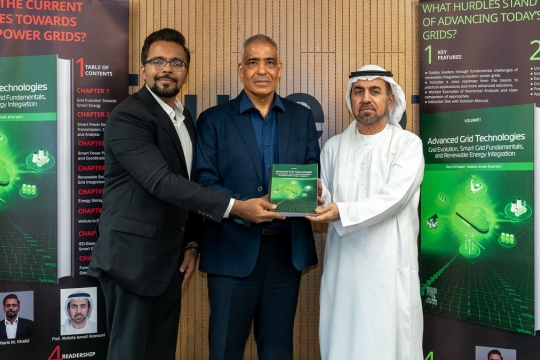
Textbook backs UAE’s push for clean energy
A major new academic textbook has been launched as a timely and practical guide to integrate renewable energy into modern power grids and aims to support the UAE’s national strategies for sustainability, innovation, and clean energy.
-
November 13, 2024
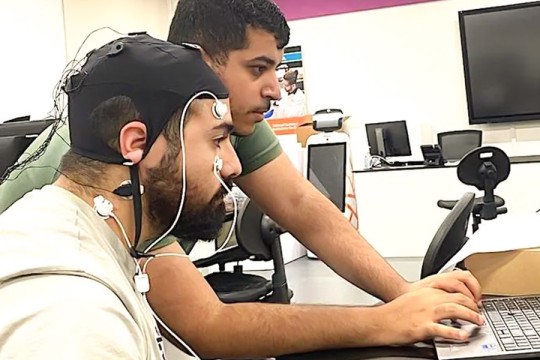
RIT Dubai team develops communication technology for verbally impaired patients
Solution uses brain signals and eye movements to articulate thoughts through an avatar.






